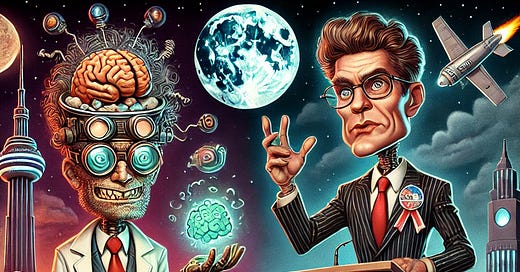Rocket Science and Rhetoric: A Mad Scientist and His Mouthpiece
One’s aiming for Mars, the other’s aiming for the mic — both might just miss the mark
The other day, I decided to ask ChatGPT a simple question: “Hey, can you compare our boys Elon and Vivek to some real and fictional villains?” Turns out, ChatGPT was way too ready for this, and what followed was a wildly entertaining deep dive into history’s rogues’ gallery and literature’s most dastardly characters. Honestly? I don’t think its answers were that far off the mark.
So, buckle up—here’s my exploration of the names that align with our newest, fearless (and maybe slightly unhinged) leaders.
Oh, Elon Musk and Vivek Ramaswamy—our modern-day overachievers with dreams as big as their egos and warnings as loud as their Twitter feeds. Musk, the self-proclaimed space cowboy, promises to catapult humanity to Mars while simultaneously making sure we can’t afford rent on Earth. Meanwhile, Ramaswamy, the biotech wunderkind-turned-political provocateur, has built a brand on stirring up just enough chaos to keep people Googling his name. Both embody that delightful mix of genius and hubris that history loves to romanticize—until it backfires spectacularly.
But hey, we’ve seen this movie before, haven’t we? History (and literature) is practically littered with ambitious types who were sure they knew better than everyone else. Spoiler: They didn’t.
Elon Musk: The Guy Who Read Frankenstein and Took Notes
Let’s start with Elon Musk, the poster child for “What could possibly go wrong?” He’s like Dr. Frankenstein if Dr. Frankenstein had billions of dollars, a rocket fetish, and a weirdly obsessive fan base. From Mars colonies to brain chips to cars that might spontaneously combust, Musk is determined to drag humanity into the future—kicking, screaming, and probably needing a software update along the way.
Sure, he’s warned us about the dangers of AI, but that hasn’t stopped him from building robots that look like they’re auditioning for The Terminator. Neuralink promises to let you Google things with your brain, but let’s be real—how long until it’s just a premium feature for Tesla owners? Musk’s vision might be bold, but it also feels like the setup to a dystopian novel where the rich upload their consciousness while the rest of us are stuck rebooting our Wi-Fi routers.
And the historical parallels? Oh, they’re rich. Take Wernher von Braun: a genius whose rockets powered both Nazi weapons and NASA’s moon missions. Innovation doesn’t come with a moral compass, and Musk is a walking, tweeting reminder of that. His empire could save the planet—or accidentally turn it into the set of Mad Max.
Vivek Ramaswamy: Your Friendly Neighborhood Agent of Chaos
Then there’s Vivek Ramaswamy, who has apparently read Othello and decided, “I could out-Iago Iago.” With the rhetorical flair of a debate club champ and the subtlety of a jackhammer, he’s made a career out of weaponizing hot-button issues to climb the political ladder. He’s the kind of guy who’d turn a Thanksgiving dinner argument into a TED Talk about his genius.
His rise to fame feels eerily familiar. Think Joseph Goebbels—but, you know, without the genocide. Ramaswamy’s talent for exploiting discontent is textbook demagogue: oversimplify, sensationalize, profit. It’s like he’s building a political brand out of being “that guy” who stirs the pot just to see what happens.
History has seen this shtick before, from populist leaders to propaganda masterminds. And while Ramaswamy’s not exactly plotting world domination (yet), his knack for division and deregulation isn’t doing society any favors. The last thing we need is another clever guy who thinks tearing down institutions is the same as building something better.
Ayn Rand’s Worst Nightmare (or Fantasy)
Musk and Ramaswamy could easily be characters in Atlas Shrugged: lone wolves who believe they’re too brilliant to be bogged down by things like ethics or accountability. Musk’s Tesla empire has faced criticism for union-busting and safety violations, but hey, it’s all in the name of saving the planet, right? Meanwhile, Ramaswamy’s deregulatory crusade would happily bulldoze environmental protections and healthcare safeguards because, apparently, nothing says “progress” like letting corporations do whatever they want.
These two embody the “rugged individualist” archetype, but let’s not forget that this mindset gave us monopolistic tycoons like Rockefeller and Carnegie. Sure, they built empires, but they also left millions in poverty and forced lawmakers to invent things like antitrust laws. History is clear: unchecked ambition tends to leave everyone else holding the bill.
Why These Two Might Break Humanity (or Just Annoy Us to Death)
Let’s not pretend Musk and Ramaswamy are outright villains—they’re more like those side characters in history who think they’re the main event. Musk dreams of a future where humanity escapes to Mars, but only if you can afford the ticket. Ramaswamy’s political antics, meanwhile, seem less about fixing problems and more about seeing how many headlines he can generate in a week.
The problem isn’t their ambition; it’s their glaring lack of self-awareness. History has repeatedly shown us what happens when powerful individuals prioritize their vision over reality: exploited workers, misused technology, and societal chaos. Whether it’s Gilded Age tycoons, Cold War scientists, or propaganda kings, the lesson is the same—unchecked ambition is a time bomb, and we’re all sitting a little too close.
The Takeaway: Accountability, Please?
Look, we’re not saying Musk and Ramaswamy are going to destroy the world—but if they do, we called it. Like Frankenstein or Iago, they’re a reminder that big brains and big egos can lead to big problems. If we don’t hold them accountable, their grand plans might leave the rest of us scrambling to clean up the mess.
So, let’s learn from history, shall we? Maybe, just maybe, we don’t need another cautionary tale about what happens when ambition outpaces accountability. Otherwise, the future might look less like a sci-fi utopia and more like a really depressing episode of Black Mirror.




